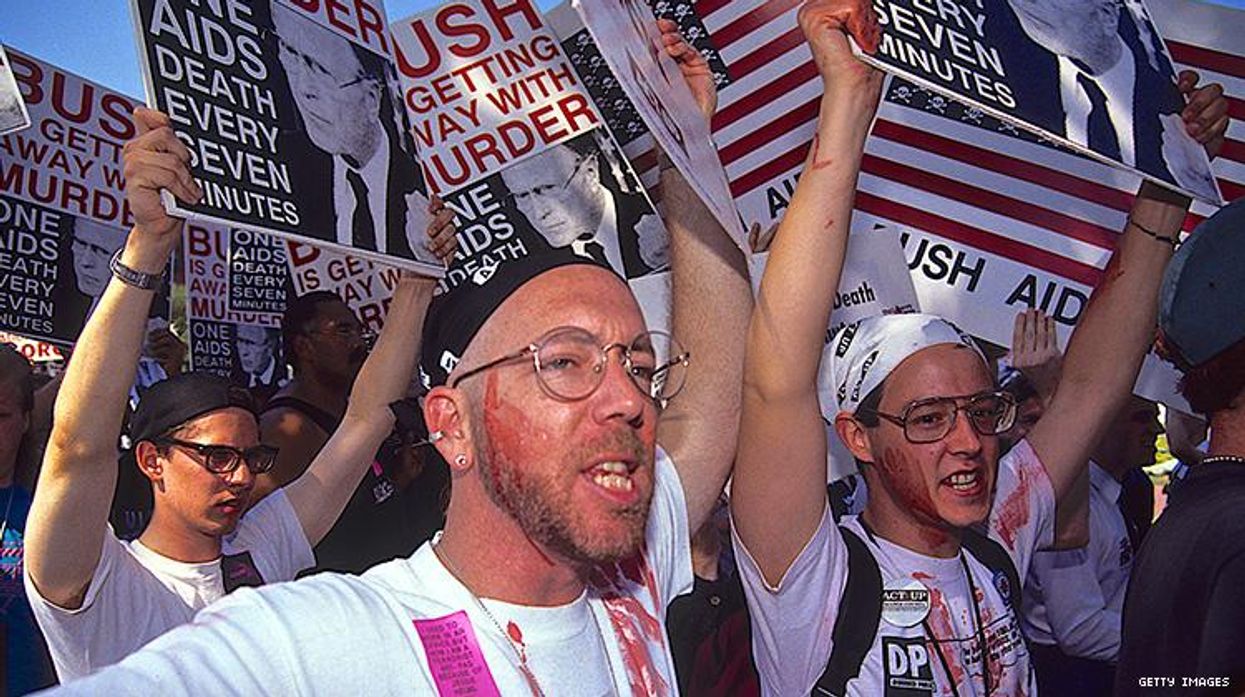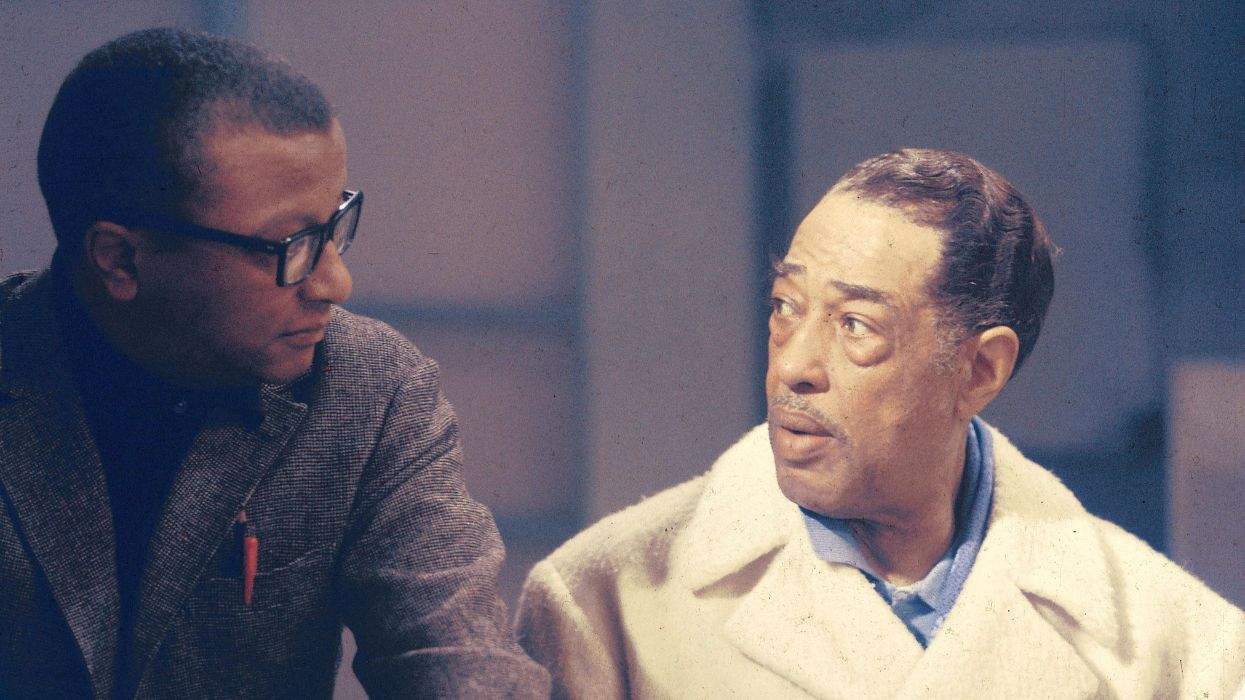As AIDS activists entering our fourth decade of direct action movement work against HIV, ACT UP New York offers a view of "what's next" in the fight to end the epidemic.
Faced with an abominable orange head (of state) who is immune to shame, a focus on proactive engagement is key to challenging the overwhelming funding cuts, diversions, deceptions, and back-sliding policies that have put the HIV community at risk.
Given such dire political times and considering our early history of dramatic, paradigm shattering accomplishments, later tenacious gains as our movement and principles spread to care and policy areas globally and the recent advancement of the game changing preventive measures of "PrEP", "PEP", and "U=U", some may think that the work of AIDS activists is largely done. But they would be wrong.
Let's take a look at some clear-eyed achievable ways we can oppose those challenges, continue the fight, improve the lives of people with and at risk of HIV infection, and finally end the ongoing epidemic status of HIV.
Education and 21st Century Policy and Prevention Strategies
Some readers can recall when public discussions, advertisements, programs, and venues offered accurate, up-to-date HIV information seemingly everywhere--not so at present. Schools HIV curricula have mostly not been updated since then, so too many younger Americans are unaware of current life-saving preventive strategies.
More to the point, most HIV curricula are not actually being taught, least of all by trained health educators. Accurate information is the natural antidote to stigma and fear. Young people need to know about all their options for preventing HIV transmission:
-- Taking a medication daily to immunize yourself against HIV infection (Pre-Exposure Prophylaxis - PrEP)
-- Taking a medication for 28 days after being exposed to the virus to prevent it from infecting you (Post-Exposure Prophylaxis - PEP) and
-- Using a course of medications to fight an existing infection so that you are no longer able to infect others, so that the virus is Undetectable, making the infected person's virus Untransmittable known as "U=U".
All of these are as effective (if not more effective) at preventing HIV than condoms. Stigma says that HIV infection is a moral failing, and avoidance of people with HIV is effective enough prevention. However, more than one-third of HIV infected people are unaware of that infection, even if they believe they are HIV negative. HIV transmission can occur without either party being at fault or even aware of it. In part because HIV infection can often take up to ten years to show symptoms.
People need to know the importance of routine testing, even if they and their partners feel fine. If understanding these things became the new normal, we would see HIV rates plummet, starting with youth.
Accurate and up-to-date sex education is a bipartisan issue. HIV awareness is critical to all our efforts. Here's what you can do to promote comprehensive HIV education in your community:
-- Ask teenagers that you know what they are learning about HIV.
-- Know your state's HIV education laws and file complaints if local schools are out of compliance.
-- Demand that students be taught by a trained health teacher, nurse, or guest expert.
-- Make sure students are learning about PrEP, U=U, that it can be ten years before symptoms show, about oral STD transmission and to have annual HIV tests.
Decriminalization as Public Health Policy for HIV in Sex Work and Drug Use
Most visible signs of HIV's impact on our bodies have faded, thankfully. But the less visible stigma, fear, and ignorance about HIV has allowed HIV criminalization to persist, still using outdated information about transmission and legislating penalties for people living HIV who "knowingly" put others at risk--without regard for treatment, ability to transmit or use of preventive measures. Since awareness of HIV status is legally necessary to indict, the threat of legal jeopardy impedes HIV testing--the most essential action in the defeat of the ignorance, fear and stigma enabling HIV to persist at epidemic levels.
Decriminalization in many forms is critical as a public health imperative. In effect, the criminalization of drug use, sex work, and HIV is racist due to policing that predominantly affects Black, brown, and trans people across the country--the same communities at greatest risk for HIV transmission. Condoms are still used as evidence in the prosecution of sex work, especially among trans people of color--literally penalizing these people for protecting themselves and others. Current anti-trafficking laws--while effective in fighting abductive and abusive practices--also more harshly penalize adults choosing sex work. So progress towards effective, enforceable harm reduction policies for sex workers remain more distant and less attainable.
Stigma and criminalization drive such problems underground. Headlines decrying prescription opiate use in "mainstream" communities are matched by a clamor for new treatments, while methamphetamine use remains "illicit" and treatments for it largely stop at tough-love abstinence therapy. There is scant formal training or protocol for dealing with meth use emergencies. Drug laws prevent development of anti-craving, nerve repairing treatments derived from plants associated with recreational use.
Meth use, probably due to its disinhibitory properties when used in our still stigmatized community, has remained linked to sex practices in the queer community and affects risk taking, sleep patterns and nutrition among HIV affected and at-risk people. Ongoing efforts have created harm reduction programs for methamphetamine users. These utilize reduction of use and lessening of methamphetamine's effect as a legitimate goals in treatment. Fundamentalist notions that anything short of abstinence is failure do not allow for therapies, pharmaceutical or psychological, to develop or progress.
These and other decriminalization efforts and perspectives are crucial in the fight against HIV, racism and transphobia. Here are some things you can do to help in that fight:
-- Find out about your state's HIV criminalization laws and lobby for their repeal.
-- Ask your local police departments if condoms are ever entered as evidence in sex-work prosecution, and protest that practice.
-- Learn about the ways that sex workers are disproportionately impacted by trafficking laws (such as SESTA/FOSTA) and demand to repeal them. Additionally, join efforts to advocate for the decriminalization of sex work entirely.
-- Demand that local hospitals, treatment centers and counselors make harm-reduction programs available for substance users.
-- Ask your local congressperson to support the development of new pharmaceutical treatments for methamphetamine users.
Greed and Apathy: Familiar Barriers to Effective, Novel, and Accessible Treatment, Housing, Care, and Cure
Central to the history of ACT UP has been its influence in the development of HIV therapies. AZT was the first treatment proven to affect the virus. It came to the market in 1987 at $10,000 a year. In response, ACT UP members stormed the New York Stock Exchange. It was mainly in response to rising public pressures like this that pharmaceutical companies began to decrease the price of antiretroviral drugs.
It was many years and many deaths later that successful combination therapies successfully suppressed the virus, even making it untransmittable. Early on after they were developed, we recognized that access to care was lacking, that drug prices were still too high, and that our work would never be done without addressing the core inequalities that still drive the epidemic.
Along with the greed of some drug developers, there is the hopeful perspective that current treatments will suffice. That settling for current treatment and denial of the cumulative damage long term treatment may cause have added to the inertia surrounding novel therapy and cure research.
Luckily, a few novel treatment approaches have recently come to light.
Drug trials for immunotherapy agents using broadly neutralizing antibodies (or bNAbs) are currently enrolling, and are unrelated to all existing forms of treatment. They consist of long acting small injections under the skin that have the potential to interfere with the latent reservoir of infected cells not eliminated by standard treatment. Although bNAbs and other new immunologic approaches have attractive properties, immunotherapies are currently expensive to produce. Therefore, accessibility and affordability of new drugs should and will remain an important component of future HIV research.
Far too many advances today consist in tinkering with existing treatments. This is the case not only for lack of alternate action, but by design pharmaceuticals slowly release multiple slightly edited versions of the same product, so as to extend the patent life and their profit. This practice is called evergreening and was seen recently when activists showed that Gilead Sciences delayed the release of Descovy as PrEP to extend profits on Truvada as PrEP.
Since these are the drugs used in PrEP and PEP, there is a monopoly by Gilead Sciences--a $22.13 billion dollar pharmaceutical company. At the moment, a month supply of PrEP costs at least $2,000/month though all the research and development was taxpayer funded. Because of activist efforts the drug is set to go generic in 2021 and co-pay assistance programs have increased dramatically. But with PrEP and with PrEP still inaccessible for many including Black, brown, trans, and nonbinary people, we've still got work to do. With ongoing lawsuits in action, and public outrage growing with knowledge, we are much closer to winning the fight for universal access to PrEP.
Here are ways you can contribute to the development of HIV therapies, the fight for a cure, and ensure universal access to PrEP:
-- Familiarize yourself with the newest HIV research and ongoing clinical studies at aidsinfo.nih.gov and at clinicaltrials.gov.
-- Learn about the eligibility criteria and study design.
-- Understand the risks and benefits of participating in the trials.
-- Encourage others to participate in studies, especially women and Black, brown, trans and latinx people.
-- Contact your local hospitals and PCPs to get enrolled.
-- Demand universal PrEP programs, and break any and all patents inhibiting people access from this revolutionary drug.
Aging and HIV: The Cumulative Effect of Infection, Inaction, Greed and Stigma.
The eventual outcome of long-term survival is believed to be different for those who lived through extended periods of untreated viral activity. For a generation of people affected by HIV, that experience was an effect of history--early treatments were not able to completely suppress the virus. For some, this partial suppression of the virus meant exposure to multiple medications with cumulative toxic effects and also created resistance to the most common treatments.
Many today with poor access to care are experiencing the same extended period of viral activity. This means that many will also develop resistance to common therapies through interrupted dosing, and inconsistent care. In a few cases, similar resistance will occur when a person tries to use PrEP, but is unknowingly already infected.
In some cases these people are currently living with only partial suppression, or have no additional alternatives if their current therapy fails. For all of those reasons and more it is critically important to support the development of new therapies and a cure.
Isolation and depression are endemic to long term survivors. These social and mental health effects actually contribute to cognitive decline once seen as solely physical. Long term survival has also meant long term stigmatization for far too many. Drug treatments to prevent infection were in use in the early nineties for pregnancy and health-care workers, their use for sexual prevention lagged thirty years later. The knowledge that viral suppression could end transmissibility was in place for years.
During all that time countless people could have avoided infection, could have protected their partners and could have lived without the stigma of a disease vector.
The inaction that was seen in the early days of the epidemic is now clearly understood as having worsened its effect on all. Inaction today is more subtle, but no less deadly. Far too few cohort studies are examining the aforementioned burden of long term viral infection, polypharmacy and depression in HIV elders.
More recently it has been proven that access to housing is one of the strongest predictors of successful viral suppression. Yet HIV housing programs, where they exist, are often insufficient to address this critical link in the chain of prevention, treatment and care.
The tremendous work in changing the history of HIV must go on. There are several ways that you can alter the trajectory of aging with HIV, for current and future elders.
-- Counter the narrative that additional treatments are futile or only good for pharma profit, let others know that far too many are now untreatable, and far too many will become so.
-- Demand a cure, but recognize that lack of access will affect who gets any cure, and that additional treatment may be necessary until a cure is in place
-- Support aging programs with your time and funds. Create opportunities to share time with long-term survivors, but recognize that it may require patience and persistence. Some are living with post-traumatic loss and unexpressed grief or guilt.
Most of all, keep in mind that the mission and vision that created the ACTUP movement and that changed the history of HIV is simple, timeless and crucial.
SILENCE EQUALS DEATH. ACT UP. FIGHT BACK. END AIDS.
ACT UP NY: Founded in 1987, ACT UP (AIDS Coalition to Unleash Power), is a diverse, non-partisan group of individuals united in anger and committed to direct action to end the AIDS crisis. ACT UP NY meets every Monday night at 7:00 PM in Manhattan at the The Lesbian, Gay, Bisexual & Transgender Community Center (208 W 13th St, New York, NY 10011).















Charlie Kirk DID say stoning gay people was the 'perfect law' — and these other heinous quotes
These are some of his worst comments about LGBTQ+ people made by Charlie Kirk.